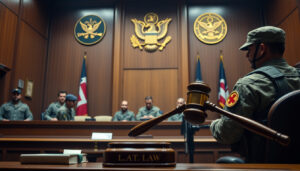In recent years, the military has seen an increased focus on addressing sexual assault allegations. While this movement has created much-needed awareness and action, it has also resulted in a complex landscape for servicemembers who may find themselves facing false allegations. These accusations can have severe repercussions, not only threatening military careers but also harming reputations and families. According to the Department of Defense, there were approximately 7,816 reports of sexual assault in the military in fiscal year 2020, underscoring the seriousness of the issue. Still, it’s vital to remain vigilant against allegations that are unfounded and potentially damaging.
If you or a loved one is embroiled in a situation involving false sexual assault allegations, this comprehensive guide aims to provide clarity on how to navigate through such distressing circumstances effectively.
Understanding the Landscape of False Allegations
What Constitutes a False Allegation?
A false allegation occurs when an individual makes an untrue claim of sexual assault against another person. The motivations behind these accusations can vary widely and may include:
- Personal vendettas: Issues stemming from interpersonal conflicts or disputes.
- Misunderstandings or miscommunications: Situations that may have been misinterpreted.
- Manipulation: Using allegations as leverage in a separate legal, professional, or personal dispute.
The Impact of False Allegations
The fallout from false allegations can be devastating, leading to:
- Command-directed investigations, which are often intrusive and thorough.
- Administrative actions and potential separation from service.
- Damage to personal relationships and reputations.
The stakes are high, and it’s essential for servicemembers to understand their rights and the steps they can take to protect themselves.
Key Steps to Take if Facing False Allegations
1. Do Not Panic
The initial instinct may be to panic when faced with an allegation, but it’s crucial to remain calm and collected. Emotional reactions can sometimes escalate the situation or impact your ability to think clearly about the next steps.
2. Seek Legal Counsel
Engaging the services of a military defense lawyer or a civilian defense lawyer who specializes in military law should be your next move. They can provide essential advice tailored to your unique situation and guide you through the intricacies of the legal process.
Why Hire a Military Defense Lawyer?
- Experience in Military Law: They understand UCMJ regulations, command structures, and military-specific protocols.
- Strategic Defense: Military attorneys specializing in court-martial cases can craft a robust defense, particularly when dealing with sexual assault allegations.
3. Document Everything
Immediately start collecting evidence related to the allegations:
- Written communications: Emails, texts, and any other relevant correspondence.
- Witness statements: Identify and document anyone who might support your version of the events.
- Personal notes: Keep a journal of your interactions related to the situation.
Documentation can serve as vital evidence in defense of false accusations.
4. Avoid Public Discussion
Do not discuss the allegations with fellow servicemembers or on social media. Public discourse can come back to haunt you, impacting your defense strategy or contributing to a negative narrative that can complicate legal proceedings.
5. Understand the Investigative Process
If you are subject to a command-directed investigation by CID (Criminal Investigation Division), OSI (Office of Special Investigations), or NCIS (Naval Criminal Investigative Service), it’s crucial to understand your rights and how the investigation will unfold. Be aware of:
- Investigation timeline: Understanding how long investigations typically take can help manage expectations.
- Cooperating with attorneys: Always have your attorney present during any interviews or interrogations.
Preparing Your Defense
1. Building a Defense Strategy
Your military defense lawyer will help you prepare a defense strategy that may include:
- Challenge the credibility of the accuser.
- Investigating inconsistencies in their story.
- Presenting corroborating evidence from witnesses.
2. Utilizing Character Witnesses
Character witnesses can bolster your case by offering insights into your character and integrity. Having fellow servicemembers, friends, or family vouch for your character can provide substantial weight against allegations.
3. Engaging in Thorough Cross-Examination
In the event of a hearing or trial, cross-examining the accuser and any witnesses can be an effective way to reveal inconsistencies in their stories. This is where your military defense lawyer’s expertise will come into play, utilizing techniques such as:
- Impeaching witnesses: Bring inconsistencies in their statements to light.
- Exposing motives: Highlight potential biases or reasons they may have for making false allegations.
Additional Resources and Support
1. Seek Support Networks
Navigating legal challenges can be isolating. Engage with support groups for servicemembers facing legal issues, which are often available on military bases or through online platforms. These networks can provide emotional support and practical advice.
2. Utilize Military Resources and Regulations
Familiarize yourself with military resources that can aid your situation:
- UCMJ Regulations: Understanding the UCMJ, specifically Articles related to sexual offenses and false accusations, can illuminate your rights.
- Social Services: Many military branches have services that provide counseling and legal assistance.
For further information, you might seek resources from the Department of Defense Sexual Assault Prevention and Response Office.
Conclusion
Facing false sexual assault allegations in the military is a daunting situation, but there are resources and steps you can take to protect yourself. From hiring a proficient military defense lawyer to systematically documenting your experiences, being proactive and informed is essential.
If you or a loved one are facing legal issues in the military, don’t hesitate to reach out. Contact Gonzalez & Waddington, Civilian Military Defense Lawyers, at 1-800-921-8607 for a free consultation. Our experienced team represents servicemembers worldwide.
Understanding the legal landscape and your rights can make all the difference when navigating these challenging waters. Stay informed, stay prepared, and know that you are not alone.



